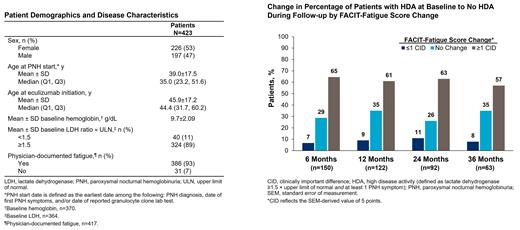Abstract
Background: Fatigue is a common symptom associated with paroxysmal nocturnal hemoglobinuria (PNH). Eculizumab, a C5 inhibitor approved for treatment of PNH, has been shown to significantly alleviate fatigue, as indicated by reduced scores on the Functional Assessment of Chronic Illness Therapy-Fatigue scale (FACIT-Fatigue). FACIT-Fatigue scores range from 0-52 (higher scores indicate less fatigue); this assessment is validated for use in patients with PNH and has been used extensively both in clinical trials and in the International PNH Registry. In patients with cancer, the FACIT-Fatigue clinically important difference (CID) is estimated to be improvement of 3-5 points. This CID is commonly applied in PNH studies; however, no disease-specific CID for FACIT-Fatigue has been estimated in patients with PNH. A PNH-specific CID would be informative in evaluating changes in fatigue impact and could serve as a more robust criterion for evaluating treatment efficacy. The objective of this analysis was to determine the FACIT-Fatigue CID for patients with PNH using distribution- and anchor-based approaches and real-world data from the International PNH Registry.
Methods: Adults with PNH who initiated eculizumab within 28 days of enrollment in the PNH Registry as of January 2021 with non-missing baseline FACIT-Fatigue scores were included in the analysis. FACIT-Fatigue scores were assessed at baseline and 6, 12, 24, and 36 months. Two distribution-based CID estimates were calculated using: 1) 0.5 × SD and 2) standard error of measurement (SEM). The SEM was calculated as SD−sqrt(1-α), where α represents the internal consistency measurement Cronbach's alpha. Cronbach's alpha was calculated from the 13 FACIT-Fatigue subscales. Anchor-based estimates considered 2 continuous patient-reported outcome variables: 1) European Organization for Research and Treatment of Cancer (EORTC) Global Health Status Quality of Life (QoL) summary score (quartiles; higher scores indicate better quality of life), and 2) EORTC Global Health Status Fatigue Subscale score (quartiles; lower scores indicate less fatigue). The baseline FACIT-Fatigue score was calculated for each predefined categorization of the anchors; the mean of differences in FACIT-Fatigue between adjacent categories was calculated and referenced as the anchor-based CID. Changes in anchors and high disease activity (HDA) shift from baseline to each follow-up visit were then assessed by FACIT-Fatigue score change (≤1 CID, no change, or ≥1 CID). HDA was defined as lactate dehydrogenase ratio ≥1.5 × upper limit of normal and ≥1 of the following: history of a major adverse vascular event (including a thrombotic event); anemia; or physician-reported abdominal pain, dyspnea, dysphagia, fatigue, hemoglobinuria, or erectile dysfunction.
Results: 423 patients were included in the analysis (Table). The majority of patients were white or of Caucasian descent (84%); 3% were of Hispanic or Latino ethnicity. At baseline, 93% of patients had physician documentation of fatigue in their medical history (mean FACIT-Fatigue score, 29.4). The 2 distribution-based CIDs were 7 using 0.5 × SD and 5 using SEM; internal consistency was high (α=0.87). For anchor-based measurements, the CID was 8 using the EORTC QoL score and 10 using the EORTC fatigue subscale score. The percentage of patients who changed from having HDA at baseline to no HDA at eculizumab-treated follow-up visits increased over time. Using the SEM as the referent CID (owing to the high α value), the majority of these patients experienced >1 CID in FACIT-Fatigue that was sustained through 36 months (Figure). Results were similar when 0.5 × SD was used.
Conclusion: Collectively, these results support the use of 5 points as the CID for FACIT-Fatigue in individual patients with PNH, which, although not necessarily the minimal value, is close to the range of CIDs reported in other diseases (3-5 points). This finding, obtained from a real-world dataset with a large number of patients, helps establish an important metric for assessment of the meaningful treatment response of patients with PNH. Of note, this CID is markedly smaller than the group average FACIT-Fatigue improvement of 10 points achieved with long-term eculizumab treatment in the pivotal blinded Phase 3 TRIUMPH study.
Cella: FACIT: Membership on an entity's Board of Directors or advisory committees. Ueda: Sanofi: Consultancy, Honoraria; Novartis: Consultancy, Honoraria; Chugai Pharmaceutical: Consultancy, Honoraria, Research Funding; Alexion Pharma: Consultancy, Honoraria. Tomazos: Alexion, AstraZeneca Rare Disease: Current Employment. Gustovic: Alexion, AstraZeneca Rare Disease: Current Employment. Wang: Alexion, AstraZeneca Rare Disease: Current Employment. Patel: Alexion, AstraZeneca Rare Disease: Current Employment. Schrezenmeier: Novartis: Honoraria; Alexion, AstraZeneca Rare Disease: Honoraria, Other: Travel support, Research Funding; Roche: Honoraria; Apellis: Honoraria; Sanofi: Honoraria.


This feature is available to Subscribers Only
Sign In or Create an Account Close Modal